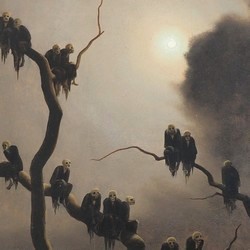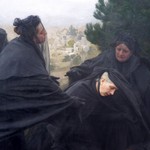
I don’t usually write an article every year related to the feast of All Saints; I only do so occasionally. But if I had started back in 2012, as I did with the feast of Sant Jordi, for example, I could already have shared fourteen wonderful songs by Carl Loewe, and I would still have material for many more years. For Loewe loved to write about spirits, ghosts, and graveyards—and he did it very well.
Just to give you an idea: around 1900 a complete edition of Loewe’s songs was published, arranged thematically in seventeen volumes. We should understand “songs” in a broad sense, because the title speaks of ballads, legends, Lieder, and songs: Gesamtausgabe der Balladen, Legenden, Lieder und Gesänge. The eighth volume was entitled Geisterballaden und Geschichten. Todes- und Kirchhofsbilder (Ballads and Stories of Ghosts. Images of Death and Graveyards) and it contained nineteen songs. But, as the editor clarified in the preface, these were only the songs that did not clearly fit into any other volume. In other words, many others matching this description could be found among the volumes devoted to Scottish, Nordic, and French ballads, to Goethe’s poems, and so on.
The song I would like to share with you for this All Saints’ week is Geisterleben (A Spirit's Life). It is included in this eighth volume of the complete edition, but was originally published in 1828 as part of Opus 9, an opus that, now that we feature it on Liederabend for the first time, deserves a few lines of explanation, because it is somewhat complicated. Between 1823, when Op. 1 appeared, and 1827, with Op. 8, Loewe published once or twice a year, each time with between two and six songs. Then, in 1828, perhaps encouraged by good sales and feeling it was time to take the plunge, he published Gesammelte Lieder, Gesänge, Romanzen und Balladen, Op. 9, which must have been a selection of works he had kept in his sheet-music drawer. A very broad selection: fifty-four songs, composed between 1817 and 1828, spread across ten booklets. And since the numbering was not consecutive but restarted in each booklet, it becomes rather cumbersome to say that Geisterleben is the song No. 4 of Booklet No. 1 of Op. 9.
Loewe composed it in 1819; as indicated in the score, shortly after Treuröschen, a ballad about a couple reunited in death. Perhaps one poem led to the other, for Geisterleben also speaks of nocturnal visits to the beloved, though in a very different tone.
Ludwig Uhland wrote the poem, a sonnet, on January 30, 1813; we even know the time and place: early in the morning, in bed, inspired by a dream he had had. A spirit speaks to us of his sad existence, confined to the grave. At night, while the living are asleep, he leaves to visit his beloved in her chamber (from his words we gather that he had not been able to do so in life), and to embrace her before returning to the tomb.
Loewe’s song begins with a piano motif that repeats throughout the first stanza, while the vocal line tells us about the spirit’s days. In the second stanza, when the spirits are set free, the song takes on the narrative tone so typical of the composer’s ballads, until our spirit addresses the girl tenderly. In the third stanza we follow him anxiously on his journey and, after an interlude, we witness in the fourth stanza the encounter itself (and the fright of the girl, who I hope eventually grows accustomed to it and finds consolation in this moment of reunion).
Our inspired travelling spirits will be Konstantin Krimmel and Ammiel Bushakevitz, in a performance of Geisterleben that I hope you will enjoy as much as I do.
Von dir getrennet, liege ich begraben,
Mich grüßt kein Säuseln linder Frühlingslüfte;
Kein Lerchensang, kein Balsam süßer Düfte,
Kein Strahl der Morgensonne kann mich laben.
Wenn sich die Lebenden dem Schlummer übergaben,
Wenn Tote steigen aus dem Schoß der Grüfte,
Dann schweb' ich träumend über Höh'n und Klüfte,
Die mich so fern von dir getrennet haben.
Durch den verbotnen Garten darf ich gehen,
Durch Türen wandl' ich, die mir sonst verriegelt,
Bis zu der Schönheit stillem Heiligtume.
Erschreckt dich Geisterhauch, du zarte Blume?
Es ist der Liebe Wehn, das dich umflügelt!
Leb wohl! ich muß ins Grab, die Hähne krähen.
Please follow this link if you need an English translation
















